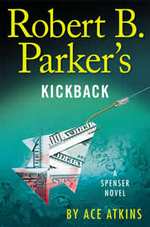 Kickback
Kickback
by Ace Atkins
Series: Spenser, #43Hardcover, 292 pg.
G.P. Putnam’s Sons , 2015
Read: May 20, 2015

As you may have noticed yesterday, I read Ace Atkin’s latest novel featuring Robert B. Parker’s Spenser. Now, with Ace Atkins/Reed Farrel Coleman taking over Robert B. Parker’s characters it’s really hard for me to be dispassionate/critical — unless they annoy me — or worse (see Michael Brandman, or — <a href="https://irresponsiblereader.com/2014/01/28/murder-in-the-ball-park-by-robert-goldsborough” target=”_blank”>Robert Goldsborough doing that for Rex Stout). I am capable of actual critical thought, I think. I’m pretty sure. But it takes time, and I just want to get this up. Soooo, I’m going to try to throw up some quick thoughts/impressions on Kickback
It started off strong — a couple pages of intro material from a third-person point of view that established a hopeless, inevitable tone. And then we turn the page and get something that might as well be vintage Parker. I smiled like a goofball throughout the note-perfect first chapter. It was like visiting an old, dear friend. Speaking of old friends, loved the callback to The Godwulf Manuscript (which, because I’m that kind of nerd, I feel compelled to point out I recognized before Atkins spelled it out). Atkins has been, and continues to be, skilled at dropping in these bits of Spenser’s background — enough to demonstrate that he knows the world and to satisfy fans like me — but not so much to clutter up things. Still, it’s time for Paul to show up.
As this is the 43rd installment of this series, it’s going to be reminiscent of a few others — there’s a little bit of Small Vices in this, and a couple of others, but this is primarily a new Ceremony, but without the moral ambiguity. In this case, we have judicial (and police) corruption tied to a private prison (in all but name) for adolescents in a small town. Some people have tried to fight this, but it only serves to make things worse — fatally so in some cases. This isn’t anything new to Spenser or crime fiction, in fact, it’s borderline cliché. But Atkins treats it with respect, and uses the tried and true story to reflect on current problems with the prison industry.
Hearkening back to Crimson Joy (maybe others that I’m not remembering), we have some third-person intercalary chapters — more successful than the serial killer’s POV in the earlier work. These trace the arrest, court appearance and detention of one of the town’s youth. Not Spenser’s client — but someone he befriends. The knot in my stomach got tighter and tighter each time. Really well done.
I continue to like Susan à la Atkins, she’d gotten boring during Parker’s later years, but she’s back and fun. Hawk is still Hawk, but Atkins has turned back the clock a bit on him, too. I’m going to stop here before I mention how Belson, Quirk, and so on have received similar treatment. This has reinvigorated the series, renewed my interest (and, from what I’ve seen) and the interest of others — this is just what Spenser needed. Yes, I’d rather Parker had done this — but I’m glad Atkins has in his place.
I do think the last fifty pages or so were rushed — things outside the detention center seemed rushed — another chapter or two spent gathering evidence might have helped me accept things. Still, so many other things in this one worked so well, I was able to overlook it (I might have harsher things to say later on, or with future re-reads).
I’m giving this 5 Stars. I’m not utterly convinced it earned it — if it was another author with another P.I., I might not. At the same time, from page 1 on, I was hooked and only put this down for a few seconds at a time when work required it until I was done. I laughed, I worried about a couple of clients, I had fun — I was thoroughly engaged the whole time. Which pretty much equals 5 Stars no matter who wrote it and who starred in it. I really, really liked it — but I could’ve told you that was probably going to be the case months ago when I ordered it.
—–


